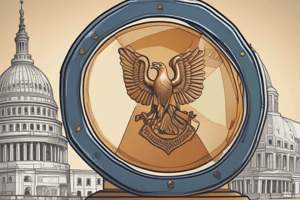Podcast
Questions and Answers
What is critical for maintaining positive relationships with government officials?
What is critical for maintaining positive relationships with government officials?
- Regularly assessing political risk
- Implementing strict financial regulations
- Developing aggressive lobbying tactics
- Adhering to ethical standards and transparency (correct)
Which of the following best describes the importance of strategic planning in government relations?
Which of the following best describes the importance of strategic planning in government relations?
- It identifies targets and develops specific strategies (correct)
- It ensures compliance with bribery laws
- It promotes political uncertainty
- It helps in fostering public scrutiny
What challenge may arise due to financial limitations in government relations?
What challenge may arise due to financial limitations in government relations?
- Enhanced public support from stakeholders
- Greater ethical compliance in lobbying
- Resource constraints impacting engagement (correct)
- Increased transparency in advocacy efforts
Why is it important to communicate strategies and actions taken to stakeholders?
Why is it important to communicate strategies and actions taken to stakeholders?
How can political uncertainty affect government relations strategies?
How can political uncertainty affect government relations strategies?
What is a primary focus of lobbying in government relations?
What is a primary focus of lobbying in government relations?
Which of the following best describes advocacy?
Which of the following best describes advocacy?
What is one of the benefits of maintaining strong government relations?
What is one of the benefits of maintaining strong government relations?
Which activity involves directly sharing information with stakeholders to influence public opinion?
Which activity involves directly sharing information with stakeholders to influence public opinion?
Who are typically considered key players in government relations?
Who are typically considered key players in government relations?
What is a common goal of community engagement in government relations?
What is a common goal of community engagement in government relations?
Which of the following activities is NOT typically categorized as government relations?
Which of the following activities is NOT typically categorized as government relations?
How can organizations effectively influence public policy?
How can organizations effectively influence public policy?
Flashcards
Government Relations (GR)
Government Relations (GR)
The process where organizations interact with government to influence policies and laws.
Lobbying
Lobbying
Directly communicating with government officials to promote or oppose policies or laws.
Advocacy
Advocacy
Promoting a viewpoint or cause, often involving public outreach.
Public Education
Public Education
Signup and view all the flashcards
Community Engagement
Community Engagement
Signup and view all the flashcards
Government Officials
Government Officials
Signup and view all the flashcards
Lobbyists
Lobbyists
Signup and view all the flashcards
Benefits of Strong GR
Benefits of Strong GR
Signup and view all the flashcards
Government Relations Planning
Government Relations Planning
Signup and view all the flashcards
Ethical Government Relations
Ethical Government Relations
Signup and view all the flashcards
Regulatory Compliance
Regulatory Compliance
Signup and view all the flashcards
Relationship Management in Government Relations
Relationship Management in Government Relations
Signup and view all the flashcards
Communicating Government Relations
Communicating Government Relations
Signup and view all the flashcards
Study Notes
Key Concepts
- Government relations (GR) is the process by which organizations interact with government officials and agencies to influence public policy and legislation.
- It encompasses a wide range of activities, including lobbying, advocacy, public education, and community engagement.
- Building and maintaining strong relationships with government officials is crucial for organizations seeking to achieve their strategic goals.
- GR strategies are tailored to specific organizations and their unique goals.
Types of Government Relations Activities
- Lobbying: Directly communicating with government officials to advocate for or against specific legislation or policies. This often involves providing information, testimony, or arguments.
- Advocacy: A broader term encompassing promoting a cause or viewpoint. May involve educating the public, public outreach activities or fundraising.
- Public Education: Communicating information to the public, stakeholders, or government officials to influence public opinion about an issue or policy initiative. It aims to raise public awareness and understanding of an organization's perspective or concerns related to government action.
- Community Engagement: Engaging with community groups, citizen organizations, and local stakeholders to build relationships and share relevant viewpoints, gain support or feedback on proposed policies.
Key Players
- Government Officials: Decision-makers at all levels of government, including legislators, regulators, and agency heads.
- Lobbyists: Professionals who specialize in government relations, advocating on behalf of clients.
- Advocacy Groups: Organizations representing specific interests or viewpoints.
- Constituents: Individuals or groups directly affected by government policies or actions.
Benefits of Strong Government Relations
- Influence Policy: Organizations can proactively shape legislation, regulations, and policies that affect their operations and interests.
- Gain Access: Strong relationships can provide quicker access to decision-makers, enabling more effective communication and collaboration.
- Protect Interests: Advocating for an organization's interests can mitigate potential threats and risks from adverse policy changes.
- Enhance Reputation: Engaging constructively with government officials can strengthen public trust in an organization and enhance its credibility.
- Gain Support: Building relationships can build support from impacted communities, local leaders, and citizens.
Key Considerations
- Ethical Considerations: Lobbying and government relations activities must adhere to ethical standards and regulations to maintain transparency, integrity, and maintain trust. Activities must not involve bribery or any illegal activities.
- Strategic Planning: Effective government relations programs require careful planning to identify targets, define goals, and develop specific strategies.
- Legal and Regulatory Landscape: Organizations must be aware of and comply with relevant laws and regulations governing government relations activities.
- Relationship Management: Building and maintaining positive and effective relationships with government officials is a crucial long-term process.
- Resources and Expertise: Successful government relations strategies need a budget for resources as well as skilled personnel, staff, and time; often requiring expert advocacy advice.
- Public Awareness: Communicating strategies and actions taken to stakeholders and the public is important in maintaining transparency and ensuring consistent messaging.
Challenges
- Regulatory Compliance: Complying with regulations, compliance with lobbying and legislation disclosure laws.
- Political Uncertainty: Changes in political power can necessitate revising strategies and adjusting expectations.
- Communication Gaps: Difficulty in communicating effectively with government officials and stakeholders.
- Resource Constraints: Financial limitations can impede effective engagement and limit access to critical resources and personnel.
- Public Scrutiny: Government relations activities can attract public scrutiny and require proactive management.
Studying That Suits You
Use AI to generate personalized quizzes and flashcards to suit your learning preferences.




